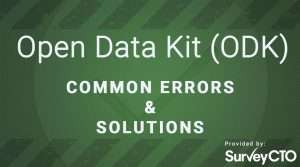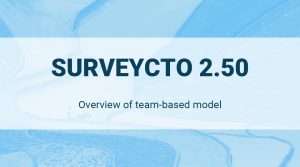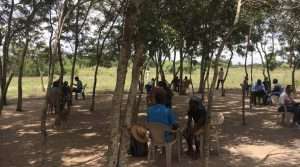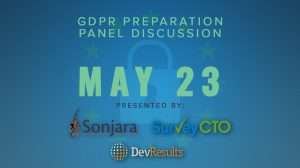
ODK ERROR: INDEXED-REPEAT ERROR
This is commonly known as an “indexed-repeat error.” It occurs when a field that is inside a repeat group is directly referenced from outside that repeat group.
Founder
Chris is the founder of SurveyCTO. He now serves as Director and Founder Emeritus, supporting Dobility in a variety of part-time capacities. Over the course of Dobility’s first 10 years, he held several positions, including CEO, CTO, and Head of Product.
Before founding Dobility, he was involved in a long-term project to evaluate the impacts of microfinance in South India; developed online curriculum for a program to promote the use of evidence in policy-making in Pakistan and India; and taught statistics and policy analysis at the Harvard Kennedy School. Before that, he co-founded and helped grow an internet technology consultancy and led technology efforts for the top provider of software and hardware for multi-user bulletin board systems (the online systems most prominent before the Internet).

This is commonly known as an “indexed-repeat error.” It occurs when a field that is inside a repeat group is directly referenced from outside that repeat group.

This error means that somewhere in your form definition you have referred to a field that does not actually exist as a field in your form.

You have received this error because the total number of begin group/begin repeat rows in your form does not match the total number of end group/end repeat rows.

You have a calculate, relevance, or constraint expression that has a syntax error that makes the expression incorrect.

This error appears when your Collect Android app tries to communicate with your server but can’t establish a secure (SSL/HTTPS) connection.

This error message means that the Collect app has encountered an issue that prevents it from functioning.

You have received an error in your ODK form that says only questions are allowed in the field-list.

A dependency cycle error typically indicates that through a series of relevance interdependencies, a field in your form is now relevant upon its own value, which is logically impossible.

This error means that whichever ODK-based Collect Android app you are using can’t connect to your ODK or ODK-based platform’s server.

We should hope for a post-ICT4D world that promotes an ecosystem of technology providers instead of hindering them.

Have you ever needed to know exactly what is happening during data collection occuring thousands of miles away? Do you find yourself backtracking and spending hours tirelessly correcting poor or fake data after collection phase of a study has wrapped up? SurveyCTO provides solutions to these scenarios – and much more! – in a variety of ways you may not even be aware of.

If you are launching a research project in a country where you don’t have a physical presence, you may be considering the possibility of collecting

In this video, you’ll learn how to seamlessly add a team to your subscription. The team-based model introduced in SurveyCTO 2.50 adds flexibility and scalability to your subscription. Learn more here https://www.surveycto.com/releases/2-50/

Learn survey form design pro tips, best practices, and even explore part of a complex, agricultural survey instrument from IFPRI’s Simrin Makhija.

An interview with Sehj Kashyap, Director of Impact Evaluation at Noora Health to learn how they were transforming hospital hallways and waiting rooms into classrooms to train family members of patients with high impact health skills.

Interview with Till Ludwig, of the Centre for Development Research, on his research trying to better understand how people choose their diets in South Asia.

Machine learning is not like blockchain: there’s something useful there, beyond the hype. That’s why we’ve been quietly working on our machine-learning roadmap for quite some time already…

On May 23rd, SurveyCTO is teaming up with DevResults and Sonjara to host a participatory panel discussion to help you prepare for the General Data

Dobility sat down with Oxfam Canada’s Anja Kessler to reflect on MERL Tech London 2018, share best practices in digital data collection, and discuss how MEL (monitoring, evaluation, and learning) is improving programing, including Creating Spaces to Act on Violence Against Women and Girls (CS).

As we’ve discussed in earlier posts, information—and the rules and regulations around using it—is changing the way research institutions, government agencies, development organizations, multilateral organizations

Here at Dobility, we’ve always taken an approach to data security grounded in the moral obligation to protect privacy and honor confidentiality pledges. For us, that moral obligation was always binding. But with the arrival of the EU’s General Data Protection Regulation (GDPR), this obligation becomes legal as well – at least where the private or sensitive data of EU citizens is concerned…
